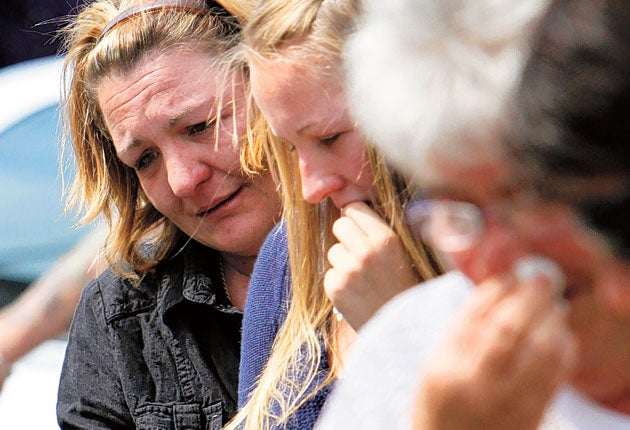Leslie Carrick-Smith: Community spirit will be invaluable for those coping with the shooting trauma
The trauma: Experiences like this tend to sharpen people's sense of their mortality; how quickly life can be wiped out

Your support helps us to tell the story
From reproductive rights to climate change to Big Tech, The Independent is on the ground when the story is developing. Whether it's investigating the financials of Elon Musk's pro-Trump PAC or producing our latest documentary, 'The A Word', which shines a light on the American women fighting for reproductive rights, we know how important it is to parse out the facts from the messaging.
At such a critical moment in US history, we need reporters on the ground. Your donation allows us to keep sending journalists to speak to both sides of the story.
The Independent is trusted by Americans across the entire political spectrum. And unlike many other quality news outlets, we choose not to lock Americans out of our reporting and analysis with paywalls. We believe quality journalism should be available to everyone, paid for by those who can afford it.
Your support makes all the difference.From events such as Hungerford, Hillsborough and Dunblane, we have learned not to leap in with psychological expertise straight away. We have to recognise that people are individuals and deal with them as such.
After the sense at first of unreality and disassociation, that "this is happening", followed by a huge sense of helplessness at the inability to control the situation, it is by no means inevitable that everybody will go on to suffer from post-traumatic stress; some will and some will not. It's not entirely predictable and might be to do with personality issues and previous experiences. There can also be a delayed onset.
Post-traumatic results come in three areas: firstly, extreme, intensive recall through dreams and nightmares, flashbacks, which can be smells or noises as well, and feelings that it is happening again. Secondly, there can be blocking of recall or avoiding anything that reminds you of it.
Avoidance can be more general, spreading to relationships with other people, such as finding it hard to express emotions, being less motivated or disinterested. And sufferers can be over-aroused, suffering bad sleep, the inability to concentrate or remember things, have outbursts of irritability or temper or physical reactions like stomach churning or clamminess. It's not a predictable disease, it's pretty arbitrary. Some people may need very long-term support; others may not.
There are psychological techniques for debriefing people early after trauma and it is probable that support networks will come into action. Employers, for instance, have a duty to provide support for their staff. The whole thing has to be very gently brought out of people's minds and dealt with. There's no "cure" in suppressing it forever.
But it is terribly important that support of the form known as "debriefing" is not forced on everyone, as for some people it will be helpful but for others it could make things worse.
Support within the community really is key, for people to be with each other, whether that is just providing physical closeness or aid with practicalities. Bereaved people, for example, are going to have to deal with legalities and all those sorts of things and they need to be supported and accompanied through this. Anybody can do that – it is the community spirit that people talk about.
If something like this had happened in a major city the effects on the individuals concerned would be no less traumatic, but the regional effects would be more diffuse. In a community of this kind, we are in small towns and rural areas where there is a strong possibility that just about everybody will know somebody who was either killed or involved. It is a loss and shock to the whole community, as it was in Dunblane. But in a small community there is less chance that people will be left emotionally on their own. The community support is likely to be stronger.
People will feel extremely vulnerable. Experiences like this tend to sharpen people's sense of their own mortality; how quickly life can be wiped out. It makes them question their own future.
All people are different but they do tend to adjust. You don't get over this sort of thing, but people can learn to live with it and the feeling of threat tends to go down. But there's no doubt that some may remain affected for the rest of their lives. While people will laugh and smile again, for some their outlook may never be quite the same.
The writer is a forensic psychologist who worked with the families of the victims of the Hillsborough disaster
Join our commenting forum
Join thought-provoking conversations, follow other Independent readers and see their replies
Comments